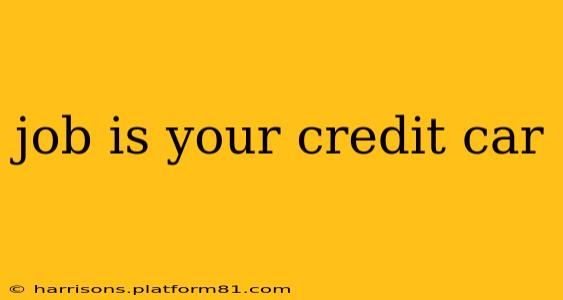Is Your Job Your Credit Card? Understanding the Financial Implications of Your Career
The relationship between your job and your finances is undeniable. But is your job actually your credit card, fueling a lifestyle you might not otherwise afford? This question probes deeper than just your paycheck; it examines the underlying financial health and long-term stability built (or not built) around your career. Let's explore this complex relationship and uncover some crucial considerations.
What Does It Mean When People Say "Your Job Is Your Credit Card"?
This phrase highlights a concerning trend: relying heavily on income to maintain a lifestyle that exceeds sustainable spending habits. It suggests that your job is primarily a means to fund immediate desires and expenses, rather than a foundation for building long-term financial security. This often involves living paycheck to paycheck, accumulating debt, and lacking substantial savings or investments. The implication is that if your job were lost, your entire financial house of cards would collapse.
How Can I Tell if My Job Is My Credit Card?
Several warning signs indicate a precarious financial situation where your job functions as your primary credit source:
- Living Paycheck to Paycheck: If you consistently spend nearly all your income before your next paycheck, you’re likely living paycheck to paycheck. This leaves little to no room for unexpected expenses, emergencies, or investments.
- High Debt Levels: High credit card debt, student loans, or personal loans are major red flags. If your income is primarily used to service these debts, you’re heavily reliant on your job for financial stability.
- Lack of Emergency Savings: A crucial aspect of financial health is an emergency fund—ideally 3-6 months’ worth of living expenses. The absence of such a fund signifies a dangerous dependence on consistent employment.
- Minimal Investments: Without investments in retirement accounts (401k, IRA) or other assets, your financial future rests solely on your current income stream.
- Lifestyle Inflation: As income rises, so does spending, often leaving you in the same financial position as before the pay raise. This is a common trap.
What are the Risks of Relying Solely on Your Job for Financial Security?
The risks are significant and far-reaching:
- Job Loss: The most obvious risk is job loss due to downsizing, company closures, or personal reasons. Without savings or alternative income streams, financial hardship will quickly follow.
- Unexpected Expenses: Medical emergencies, car repairs, or home repairs can quickly deplete funds if you’re already living paycheck to paycheck.
- Lack of Retirement Planning: Reliance on your job for immediate needs leaves little room for retirement savings, potentially leading to a financially insecure retirement.
- Missed Opportunities: Without financial stability, you may miss opportunities for education, career advancement, or entrepreneurial ventures that could improve your long-term prospects.
How Can I Break Free from This Cycle?
Breaking this cycle requires a proactive and disciplined approach:
- Create a Budget: Track your income and expenses to understand where your money is going. Identify areas for spending reductions.
- Build an Emergency Fund: Prioritize building an emergency fund before tackling other financial goals. Even small, consistent contributions make a difference.
- Pay Down Debt: Develop a plan to pay down high-interest debts, focusing on strategies like the debt snowball or avalanche method.
- Invest for the Future: Start investing in retirement accounts and other investment vehicles to build long-term financial security.
- Diversify Income Streams: Explore opportunities to diversify your income, such as freelancing, investing, or starting a side hustle.
Your job is essential for your income, but it shouldn't be your only financial lifeline. By taking control of your finances, building a strong foundation, and diversifying your income streams, you can break free from the cycle of relying on your job as your "credit card" and build a more secure and prosperous future.
